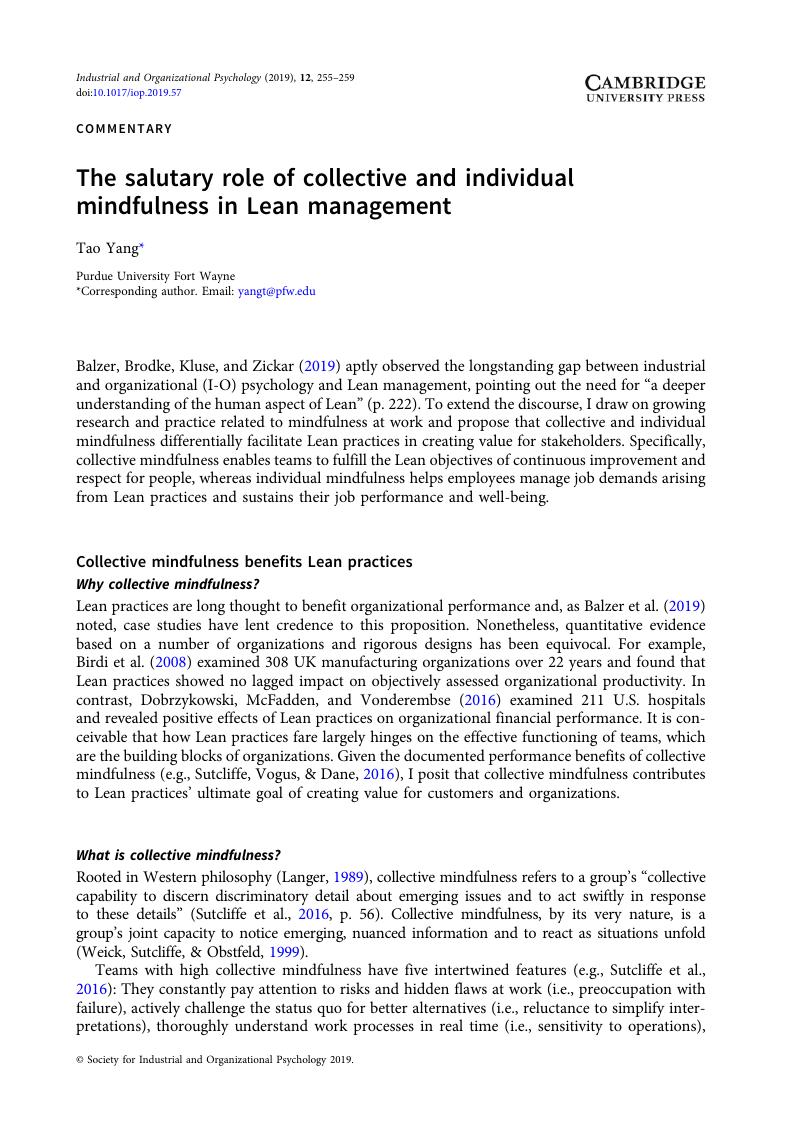No CrossRef data available.
Article contents
The salutary role of collective and individual mindfulness in Lean management
Published online by Cambridge University Press: 13 November 2019
Abstract
An abstract is not available for this content so a preview has been provided. Please use the Get access link above for information on how to access this content.

- Type
- Commentaries
- Information
- Copyright
- © Society for Industrial and Organizational Psychology 2019
References
Balzer, W. K., Brodke, M. H., Kluse, C., & Zickar, M. J. (2019). Revolution or 30-year fad? A role for I-O psychology in Lean management. Industrial and Organizational Psychology: Perspectives on Science and Practice, 12(3), 215–233.Google Scholar
Birdi, K., Clegg, C., Patterson, M., Robinson, A., Stride, C. B., Wall, T. D., & Wood, S. J. (2008). The impact of human resource and operational management practices on company productivity: A longitudinal study. Personnel Psychology, 61, 467–501.CrossRefGoogle Scholar
Brown, K. W., & Ryan, R. M. (2003). The benefits of being present: Mindfulness and its role in psychological well-being. Journal of Personality and Social Psychology, 84, 822–848.CrossRefGoogle ScholarPubMed
Dane, E., & Brummel, B. J. (2014). Examining workplace mindfulness and its relations to job performance and turnover intention. Human Relations, 67, 105–128.CrossRefGoogle Scholar
Dobrzykowski, D. D., McFadden, K. L., & Vonderembse, M. A. (2016). Examining pathways to safety and financial performance in hospitals: A study of lean in professional service operations. Journal of Operations Management, 42–43, 39–51.CrossRefGoogle Scholar
Eby, L. T., Allen, T. D., Conley, K. M., Williamson, R. L., Henderson, T. G., & Mancini, V. S. (2019). Mindfulness-based training interventions for employees: A qualitative review of the literature. Human Resource Management Review, 29,
156–178.CrossRefGoogle Scholar
Edmondson, A. C., Bohmer, R. M., & Pisano, G. P. (2001). Disrupted routines: Team learning and new technology implementation in hospitals. Administrative Science Quarterly, 46, 685–716.CrossRefGoogle Scholar
Gardner, J. W., Boyer, K. K., & Ward, P. T. (2017). Achieving time-sensitive organizational performance through mindful use of technologies and routines. Organization Science, 28, 1061–1079.CrossRefGoogle Scholar
Glomb, T. M., Duffy, M. K., Bono, J. E., & Yang, T. (2011). Mindfulness at work. Research in Personnel and Human Resources Management, 30, 115–157.CrossRefGoogle Scholar
Good, D. J., Lyddy, C. J., Glomb, T. M., Bono, J. E., Brown, K. W., Duffy, M. K., … Lazar, S. W. (2016). Contemplating mindfulness at work: An integrative review. Journal of Management, 42, 114–142.CrossRefGoogle Scholar
Grover, S. L., Teo, S. T. T., Pick, D., & Roche, M. (2017). Mindfulness as a personal resource to reduce work stress in the job demands-resources model. Stress and Health: Journal of the International Society for the Investigation of Stress, 33, 426–436.CrossRefGoogle ScholarPubMed
Hales, D. N., Kroes, J., Chen, Y., & Kang, K. W. (2012). The cost of mindfulness: A case study. Journal of Business Research, 65, 570–578.CrossRefGoogle Scholar
Jackson, P. R., & Mullarkey, S. (2000). Lean production teams and health in garment manufacture. Journal of Occupational Health Psychology, 5, 231–245.CrossRefGoogle ScholarPubMed
Kabat-Zinn, J. (1990). Full catastrophe living: Using the wisdom of your body and mind to face stress, pain, and illness. New York, NY: Delacorte.Google Scholar
Leroy, H., Anseel, F., Dimitrova, N. G., & Sels, L. (2013). Mindfulness, authentic functioning, and work engagement: A growth modeling approach. Journal of Vocational Behavior, 82, 238–247.CrossRefGoogle Scholar
Levinthal, D., & Rerup, C. (2006). Crossing an apparent chasm: Bridging mindful and less-mindful perspectives on organizational learning. Organization Science, 17, 502–513.CrossRefGoogle Scholar
Ndubisi, N. O. (2012). Mindfulness, reliability, pre-emptive conflict handling, customer orientation and outcomes in Malaysia’s healthcare sector. Journal of Business Research, 65, 537–546.CrossRefGoogle Scholar
Parker, S. K. (2003). Longitudinal effects of lean production on employee outcomes and the mediating role of work characteristics. Journal of Applied Psychology, 88, 620–634.CrossRefGoogle ScholarPubMed
Rauter, S., Weiss, M., & Hoegl, M. (2018). Team learning from setbacks: A study in the context of start-up teams. Journal of Organizational Behavior, 39, 783–795.CrossRefGoogle Scholar
Shaw, J. D., Zhu, J., Duffy, M. K., Scott, K. L., Shih, H., & Susanto, E. (2011). A contingency model of conflict and team effectiveness. Journal of Applied Psychology, 96, 391–400.CrossRefGoogle ScholarPubMed
Sutcliffe, K. M., Vogus, T. J., & Dane, E. (2016). Mindfulness in organizations: A cross-level review. Annual Review of Organizational Psychology and Organizational Behavior, 3, 55–81.CrossRefGoogle Scholar
Turner, S. F., & Rindova, V. (2012). A balancing act: How organizations pursue consistency in routine functioning in the face of ongoing change. Organization Science, 23, 24–46.CrossRefGoogle Scholar
Vogus, T. J., & Sutcliffe, K. M. (2007). The impact of safety organizing, trusted leadership, and care pathways on reported medication errors in hospital nursing units. Medical Care, 45, 997–1002.CrossRefGoogle ScholarPubMed
Wee, E. X. M., & Taylor, M. S. (2018). Attention to change: A multilevel theory on the process of emergent continuous organizational change. Journal of Applied Psychology, 103, 1–13.CrossRefGoogle ScholarPubMed
Weick, K. E., Sutcliffe, K. M., & Obstfeld, D. (1999). Organizing for high reliability: Processes of collective mindfulness. Research in Organizational Behavior, 21, 81–123.Google Scholar
Yu, L., & Zellmer-Bruhn, M. (2018). Introducing team mindfulness and considering its safeguard role against conflict transformation and social undermining. Academy of Management Journal, 61, 324–347.CrossRefGoogle Scholar
Zellmer-Bruhn, M. (2003). Interruptive events and team knowledge acquisition. Management Science, 49, 514–528.CrossRefGoogle Scholar




